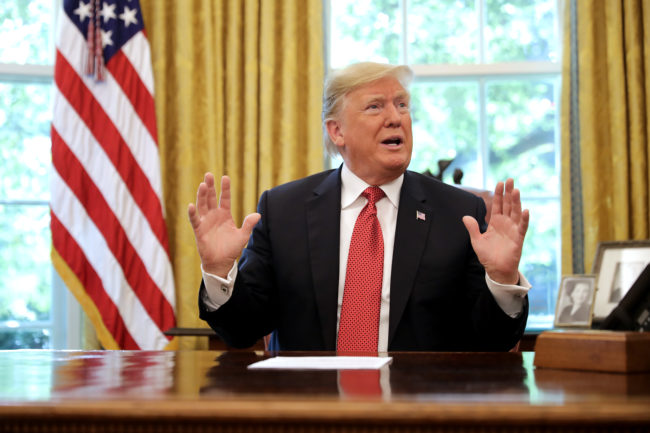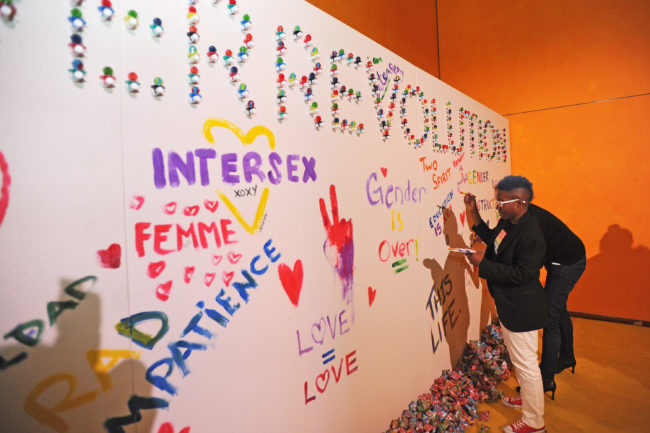What is Intersex Awareness Day and why does it matter more than ever in the age of Trump?

Processed with VSCO with c3 preset
Since it was first observed in 2004, Intersex Awareness Day has served to shine a light on the human rights issues faced by intersex people with the goal of ending “shame, secrecy and unwanted genital surgeries on intersex children.”
This knowledge and understanding is more important than ever as, according to a leaked Department of Health and Human Services (HHS) memo published in The New York Times on October 21, the Trump administration seeks to change the definition of “sex” as strictly male or female based on “immutable biological traits identifiable by or before birth,” threatening the rights of both transgender people and those whose sexual or reproductive anatomy does not fit the typical male/female binary.
For intersex rights groups, the Trump administration’s memo represents a grave threat to their very existence. “Any quest to define a bodily ‘marker’ to categorise and control marginalised sex, gender, and sexuality identities is not only false science, but fundamentally dangerous,” Hans Lindahl, director of communications and outreach at interACT Advocates for Intersex Youth, tells PinkNews. “The negative impact of this potential new regulation would be felt by intersex people across the nation,” she adds.
Intersex Americans could account for up to 5.5 million, or 1.7 percent, of America’s approximately 326 million population. To put it into context, experts say that intersex people are about as common as those with red hair.

The Trump administration’s leaked document has been widely condemned by LGBT+ activists. (Chip Somodevilla/Getty)
There are many different ways to be intersex. Some people are born with XY chromosomes, while having internal testes, a vagina, and vulva. Others are born with XX chromosome and have ovaries, while having genitalia that do not match the “typical” male or female appearance.
The leaked HHS memo also mentions that any dispute over a person’s sex would be resolved using “genetic evidence,” but interACT’s Lindahl points out that some intersex people have chromosomes that are neither XX or XY, something which would not be resolved by the Trump administration’s likely DNA testing methodology.
“The administration proposes that any dispute about one’s sex would be clarified using genetic testing, which would likely mean chromosomal testing,” she adds. “Intersex people often have chromosomes that do not line up in an expected way with their external sex organs, and can have chromosomal patterns that are not XX or XY. Intersex and transgender people know that chromosomes are a piece of trivia and a remnant from foetal development, not any meaningful predictor of gender identity.”

An installation at National Geographic’s premiere screening of “Gender Revolution: A Journey With Katie Couric” on February 2, 2017. (Brad Barket/Getty for National Geographic)
The leaked document threatens to exacerbate the trauma caused to intersex people by genital surgeries, performed by medical practitioners on intersex infants or young children in a bid to conform them to typical ‘male’ or ‘female’ physical standards.
The practice has been condemned by various UN bodies, including the World Health Organization, and human rights groups including Amnesty International and Human Rights Watch as “medically unnecessary,” yet continues to be performed on patients, often without their informed consent and with little or no explanation of the physical and mental impact of the operation.
“This memo is seeking to reinforce the gender binary which has already been carved onto the bodies of intersex people who are survivors of genital mutilation,” Sean Saifa Wall, an intersex activist who lives in Atlanta, tells PinkNews. “Intersex people who are identified at birth have already faced the physical and emotional impact of doctors’ biases against intersex infants and children. If this memo were codified into law, intersex people would be subject to further trauma and medical violence.”

Sean Saifa Wal says the document could be “disastrous” for intersex people. (Ryan Sin)
Wall, who believes Trump’s memo is a “direct affront to transgender people,” adds that the document is “simplifying sex, which for intersex people, and for all of us, is a very complicated concept.” He adds: “We are more than our biology. We are more than our chromosomes and genitalia. To reduce our existence to arbitrary notions of sex and gender will diminish the complex beauty of gender identity and expression.”
He continues: “This move would be disastrous for intersex people and compound the fear, anxiety and PTSD that so many intersex people have endured. Although we have been surely impacted by this memo, we will continue to fight for the sovereignty of our bodies and for the dignity that we all deserve.”
But as genital surgeries have been practiced in the US for decades, some activists doubt that changing the definition of sex as proposed in the HHS memo would fundamentally affect the already dire situation of intersex people.

Non-binary intersex activist Pidgeon Pagonis attends a National Geographic event on February 2, 2017 in New York City. (Photo by Brad Barket/Getty for National Geographic)
“If this re-definition is codified into federal law, this will only serve to give surgeons who ignore the UN more fuel for their already existing intersex-phobic fire,” Pidgeon Pagonis, the Chicago-based co-founder of the Intersex Justice Project, tells PinkNews. Still, the activist admits, things could get “a lot worse”—for instance, surgeons could overrule parents who do not want their intersex child to be operated on, if such procedures are enshrined in law.
For Pagonis, who is non-binary, this leaked memo is the latest attempt by the Trump administration to attack the definition of gender. “Early on, they declared gender was what was printed on your birth certificate. Then, when they realised people could have that changed, gender was equated with one’s genitalia. When they realised this could be changed too, they now have seemed to settled, temporarily, on a chromosomal definition of sex,” they say.
The activist encourages those against the contents of the leaked document to be vocal and active in their opposition. “Trust that the administration and those invested in this re-definition of sex are vigilantly watching our response to this ‘leak,'” Pagonis says, “They are testing the waters. We must give them hell, or else hell will become the law.”

